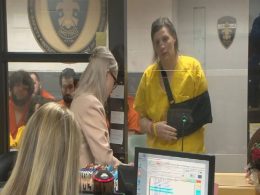Louisville, KY — The city of Louisville is taking significant steps to expand its surveillance infrastructure with the addition of more automated license plate-reading cameras, known as Flock cameras. This move is part of an effort to combat street racing, recover stolen vehicles, and enhance overall public safety.
Currently, the city has 141 Flock cameras in place, with plans to install an additional 139 cameras in the coming months. These devices, which capture images of passing vehicles and send the data to a central system, are already being used by the Louisville Metro Police Department (LMPD) to track flagged vehicles. LMPD has access to nearly 100 privately owned Flock cameras, further extending its monitoring reach.
Flock cameras have become a crucial tool for LMPD, particularly in the fight against street racing and stolen vehicles. According to reports, LMPD accesses the Flock database approximately 18,000 times a month, using the data to notify officers when a flagged vehicle is detected by the cameras. This system has proven to be an effective means of apprehending offenders and recovering stolen cars.
The expansion of Flock cameras has sparked concerns over privacy, with some questioning the implications of increased surveillance. Metro Council member Dan Seum, who supports the initiative, acknowledged these concerns but emphasized the importance of public safety.
“I know people are concerned about privacy issues, but I’m more concerned about people getting killed and carjacked and stuff like that,” Seum said. “And I don’t know how much privacy we can expect on a public road anyway. The cameras are working, and the more we can get out here to these bad actors, we’re watching you, and we’re going to get you.”
While the cameras have been largely focused on high-crime areas, the cost of installing and maintaining the system is a significant investment. Each camera costs $650 to install, with an additional $3,000 in annual monitoring fees. Rather than being monitored by MetroSafe, the cameras are placed in locations deemed critical by the police or those willing to cover the associated costs. Additionally, LMPD collaborates with 82 private Flock camera owners, including businesses, churches, and homeowners’ associations, to bolster its surveillance network.
However, some members of the Metro Council are raising questions about the strategic placement of these cameras. Council member Anthony Piagentini expressed concerns that the cameras may not be placed in the most effective locations based on patterns of crime.
“I am concerned that we are doing this not piecemeal, but I’m glad to start the conversation about it,” Piagentini said. “Do we have a plan where we should put these based off of patterns and intelligence?”
As part of its broader surveillance efforts, LMPD is also working on an initiative called FUSUS. This program aims to integrate privately owned security cameras into law enforcement monitoring. Once implemented, the FUSUS program will give police access to security cameras installed on private properties, including homes, businesses, and other private locations.
LMPD’s Jennifer Corum explained that the program would allow law enforcement to tap into a vast network of private cameras, significantly expanding the city’s surveillance capabilities. This expansion is already stirring privacy concerns, as it would give police access to footage from personal spaces, such as a home’s front porch or the camera mounted on a neighbor’s house.
Despite these concerns, Seum remains a staunch advocate for the expansion of surveillance technologies. “The more eyes on crime, the better as far as I’m concerned,” Seum stated, reinforcing his stance that increased monitoring is crucial for the safety of the community.
As the surveillance network grows, questions surrounding privacy, effectiveness, and the strategic placement of cameras will continue to shape the debate over the balance between safety and personal freedoms in Louisville.











